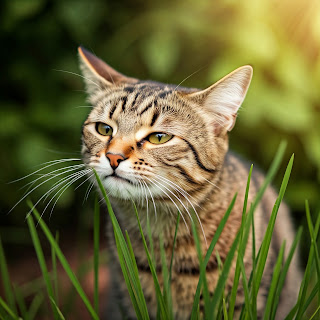Why Is My Cat Sneezing? Unpacking the Mystery Behind Kitty Achoos
If you've been blessed (or startled) by your cat's adorable "achoo," you're not alone! Cats sneezing can be cute, but it often leaves us wondering: why is my feline friend acting like a tiny sneeze machine? Sneezing in cats can be harmless, but sometimes, it might signal something more serious. Let’s explore the reasons behind your cat's sneezes and what you can do about it.
The Common Culprits: Allergies and Irritants
Just like humans, cats can be sensitive to airborne irritants. Dust, pollen, perfume, or even cleaning products can tickle their tiny noses, causing sneezes. If you notice frequent sneezing after spraying air fresheners or cleaning the house, you might have found the culprit! Stick to unscented or pet-safe cleaning products to minimize irritants.
Respiratory Infections: When to Worry
Cats can catch colds too! Upper respiratory infections (URIs) caused by viruses like feline herpesvirus or calicivirus often result in sneezing, nasal discharge, and watery eyes. These infections are more common in kittens or multi-cat households. Key signs include persistent sneezing, loss of appetite, lethargy, or fever. If these symptoms appear, it’s time for a vet visit.Foreign Objects: Unexpected Invaders
Curious cats often poke their noses into unexpected places. Sometimes, a tiny piece of grass, a seed, or other debris can get lodged in their nasal passages, causing sneezing fits. If your cat sneezes excessively and is pawing at their face, a vet might need to remove the object safely.Dental Problems: A Surprising Link
Did you know your cat’s sneezing could be linked to dental issues? Infections or abscesses in the teeth can irritate nasal passages, leading to sneezing. Regular dental check-ups and cleanings can prevent such issues.Chronic Rhinitis: A Lingering Issue
In some cases, sneezing becomes a long-term issue due to chronic inflammation of the nasal passages, often following an untreated infection. While not always curable, treatments can help manage the symptoms and improve your cat’s comfort.When to Call the Vet
While an occasional sneeze isn’t a cause for concern, frequent or severe sneezing should be evaluated by a vet. Watch out for additional signs like thick or discolored nasal discharge, difficulty breathing, or behavioral changes.Keeping Your Cat Healthy and Happy
Minimize sneezing triggers by keeping your home dust-free and well-ventilated. Provide a balanced diet to boost their immune system, and schedule regular vet check-ups for overall health monitoring.The Bottom Line
Cats sneeze for various reasons, from harmless irritants to underlying health issues. By understanding the potential causes and staying proactive, you can ensure your feline companion stays comfortable and healthy. So, the next time your cat sneezes, you’ll know whether to laugh at their cuteness or reach for the phone to call the vet. Either way, your fur baby will appreciate the love and care!











